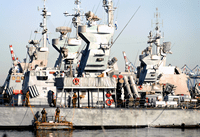In July, the Israeli navy -- a force mostly confined to the eastern Mediterranean -- sent three of its most powerful warships through the Suez Canal into the Red Sea. A Dolphin-class diesel-powered submarine passed through the canal on July 3. Two Sa'ar 5-class corvettes followed, 10 days later. The ships trained alongside Egyptian forces, then returned to Israel by mid-July. It was the largest long-range naval deployment in recent history for the 5,500-strong Israeli navy, and the first since 2005 for an Israeli sub.
The naval deployments are part of a wide range of activities meant to reinforce Israel's strategic deterrence and its increasingly close ties to neighboring Arab states. Worries over Iran's continuing nuclear ambitions, and Tehran's ongoing support for Hezbollah and Hamas, have spurred big Israeli investment in strike aircraft, submarines, surface ships and missiles -- both nuclear and non-nuclear -- tailored for long-range strikes on heavily defended targets.
Egypt shares a deep distrust of Iranian intentions. Israel and Egypt were technically at war from 1948 until signing a peace treaty in 1979. The two countries' relations have warmed since then. Today they present an increasingly unified front against Iran.

